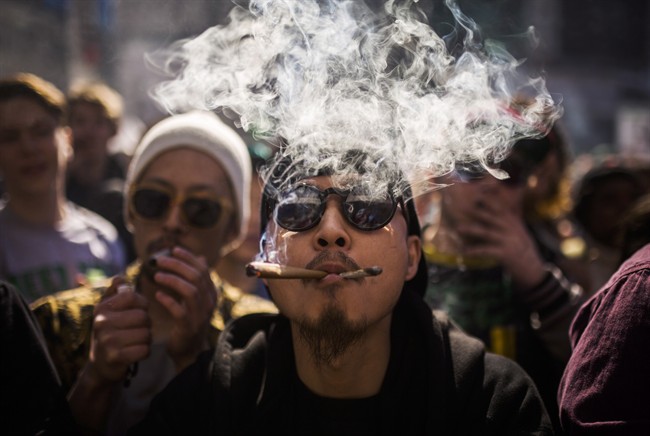The federal government is scheduled to table new legislation to legalize and regulate marijuana at noon on Thursday.

The bill is a long time coming, and the Liberals are aiming to have it become law by July 1, 2018.
Here’s what to expect.
Marijuana will still be illegal … for now
The legislation that will eventually legalize and regulate pot is being tabled Thursday, but it is not automatically the law of the land.
The bill must first pass through the House of Commons and then the Senate before receiving Royal assent, a process that will take months. Until it does attain the status of law, in summer 2018, lighting up a joint in full view of the police remains a bad idea.
WATCH: Colorado governor goes from skeptic to supporter of marijuana legalization

Growing pot in your home for recreational use, selling it for recreational use, and walking around with a bunch of it in your pocket or purse will also remain illegal, and you could be arrested and charged.
The rules will be strict
The government has made it very clear this won’t be a free-for-all. Far from it.
A special task force set up to conduct in-depth consultations and then make a series of recommendations last year made abundant use of the word “strict” in its final report.

Get weekly health news
READ MORE: Nine questions Parliament will have to answer before we legalize marijuana
The list of public spaces where you can use pot should be strictly limited, the task force recommended. Governments should also “enforce a system of strict production, distribution and sales” and impose a “seed-to-sale tracking system to prevent diversion and enable product recalls.”
The federal government will likely stick closely to those recommendations. The number of plants you can grow at home is also expected to be small (about four) and there may even be a height restriction.
Provincial jurisdiction will be respected
The government is expected (and in many cases required) to leave a great deal up to the provinces. Ottawa will mainly be in charge of licensing producers and ensuring the country’s legally sold marijuana is safe for consumption.
But it’s the provinces who will decide how pot is priced, distributed and sold, so don’t expect those details to appear in the federal bill.
A minimum age of 18 to buy marijuana will likely be set by the federal government, but the provinces will have the right to raise that age. Most will likely want to match the legal drinking age in their jurisdictions.
The Opposition won’t like it
The Conservatives, who have been vocally opposed to plans to legalize pot, are already raising concerns about the bill.
Chief among them, according to the party’s public safety critic, Tony Clement, will be how the legislation will keep the drug out of the hands of kids.
The government also needs to figure out how to police the roads for high drivers, Clement said Wednesday, and make sure “Liberal insiders don’t become millionaires or billionaires because of insider access and a monopoly of manufacturing and distribution of the product.”
WATCH: Marijuana could be legal by Canada Day in 2018 – is the country ready?

Conservative MP Kellie Leitch is already promising to repeal the legislation if she becomes Conservative leader in May and the party forms government in 2019.
The NDP, meanwhile, are likely to continue crying foul over the fact that pot won’t be decriminalized over the next year. In other words, people will still be arrested and burdened with criminal records for possession of a drug that will be perfectly legal by summer 2018.
WATCH: Trudeau avoids answering questions on decriminalization of marijuana

Marketing and packaging rules
The task force recommended limiting the advertising of pot in public places (much like the rules in place for tobacco) and restricting sponsorship and endorsements involving marijuana companies.
WATCH: Canada’s ‘Prince of Pot’ Marc Emery wonders how legal marijuana will be distributed

READ MORE: Two decisions Parliament will have to make about pot-impaired driving
If these requirements are included in the legislation, it’s likely to upset the companies already getting into the recreational marijuana industry and the investors flocking to those companies. If you want to attract consumers and get them to pay a bit more for legal pot as opposed to buying on the black market, marketing is key.






Comments